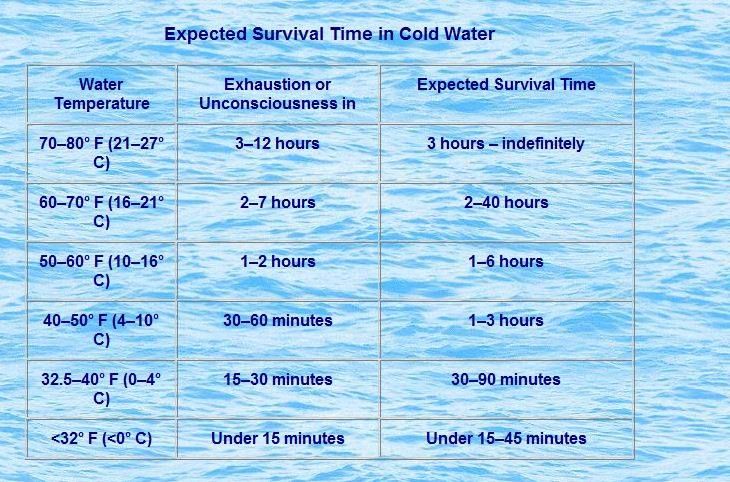So with that being said take a minute to read over these Hypothermia facts and take them into account on your next outing in 2014.

Quoted from Wikipedia.
The signs and symptoms vary depending on the degree of hypothermia and may be divided by the three stages of severity.
Mild
Symptoms of mild hypothermia may be vague with sympathetic nervous system excitation (shivering, hypertension, tachycardia, tachypnea, and vasoconstriction). These are all physiological responses to preserve heat. Cold diuresis, mental confusion, as well as hepatic dysfunction may also be present. Hyperglycemia may be present, as glucose consumption by cells and insulin secretion both decrease, and tissue sensitivity to insulin may be blunted. Sympathetic activation also releases glucose from the liver. In many cases, however, especially in alcoholic patients, hypoglycemia appears to be a more common presentation. Hypoglycemia is also found in many hypothermic patients because hypothermia often is a result of hypoglycemia.
Moderate
Low body temperature results in shivering becoming more violent. Muscle mis-coordination becomes apparent. Movements are slow and labored, accompanied by a stumbling pace and mild confusion, although the person may appear alert. Surface blood vessels contract further as the body focuses its remaining resources on keeping the vital organs warm. The victim becomes pale. Lips, ears, fingers and toes may become blue.
Severe
As the temperature decreases, further physiological systems falter and heart rate, respiratory rate, and blood pressure all decrease. This results in an expected HR in the 30s with a temperature of 28 °C (82 °F).
Difficulty in speaking, sluggish thinking, and amnesia start to appear; inability to use hands and stumbling is also usually present. Cellular metabolic processes shut down. Below 30 °C (86 °F), the exposed skin becomes blue and puffy, muscle coordination becomes very poor, walking becomes almost impossible, and the person exhibits incoherent/irrational behavior including terminal burrowing or even a stupor. Pulse and respiration rates decrease significantly, but fast heart rates (ventricular tachycardia, atrial fibrillation) can occur. Major organs fail. Clinical death occurs. Because of decreased cellular activity in stage 3 hypothermia, the body will actually take longer to undergo brain death.
Paradoxical undressing
Twenty to fifty percent of hypothermia deaths are associated with paradoxical undressing. This typically occurs during moderate to severe hypothermia, as the person becomes disoriented, confused, and combative. They may begin discarding their clothing, which, in turn, increases the rate of heat loss.
Rescuers who are trained in mountain survival techniques are taught to expect this; however, some may assume incorrectly that urban victims of hypothermia have been subjected to a sexual assault.
One explanation for the effect is a cold-induced malfunction of the hypothalamus, the part of the brain that regulates body temperature. Another explanation is that the muscles contracting peripheral blood vessels become exhausted (known as a loss of vasomotor tone) and relaxes, leading to a sudden surge of blood (and heat) to the extremities, fooling the person into feeling overheated.
It seems this topic comes up every year, “What do you guys wear during the winter?” This goes hand in hand with the topic of Hypothermia. Just doing a search on the internet for “Dressing for cold water kayaking” will reveal a ton of useful information. For myself, I usually layer up during the winter months, long pants from Columbia (they shed water very quickly), insulated rain pants over them, a micro-fiber moisture wicking t-shirt, long sleeve shirt with a wind breaker or fleece vest, and a wool stocking cap. Now I find that winter time is one of, if not the best time of year to wade and sight cast the flats. Yes, the water is cold, but typically I’m never in water much deeper than thigh deep. I will occasionally wear waders, but most days I don’t. And while I’m not completely submersed, I have still felt the effects of the cold water on my body. I always wear my PFD while I’m paddling, especially in areas where the water is much deeper or subject to swift current. Along with the other typical items that you would carry in a ditch bag (first aid kit, poncho, extra batteries, compass, etc) I carry a towel large enough to dry off, some matches and dryer lint in a zip lock bag. Dryer lint is a great fire starter if you need it. And I always let someone know where I will be going, and if I change my mind at the launch, I update them as to where I will be.
I hope these tips help, have a great and safe 2014.
